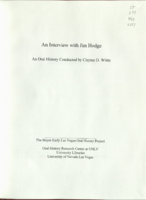Search the Special Collections and Archives Portal
Search Results

Transcript of interview with Darrin Bush by Claytee White, June 30, 2016
Date
Archival Collection
Description
In 1948 in Las Vegas, Nevada, a camera-girl-turned-cocktail-waitress and a casino credit manager welcomed the birth of their son, Darrin Bush. After attaining his education at St. Joseph’s Catholic School and Bishop Gorman High School, Bush earned his Bachelor’s degree in journalism at the University of Nevada, Reno. Bush credits his love for photography to his mother’s influence and his study of journalism. Bush’s first job after college as a room service waiter at the Sahara Hotel eventually grew into the coveted position of room service swing captain. His swing shift duties included the entertainers' dressing rooms, which meant taking care of the entertainers, getting them what they needed, and stocking their favorite foods and drinks nightly. Through his work, Bush eventually formed close friendships with several celebrities of the day. He enjoyed his work, but he never stopped honing his skills as an amateur photographer. In the mid-1980s, Bush left the Strip to become a professional photographer for the Las Vegas News Bureau. Throughout his News Bureau career, Bush photographed the casino buildings made famous by Las Vegas-the construction and the architecture of Southern Nevada’s gaming palaces-as well as iconic events in Las Vegas history. Darrin retired from the News Bureau in about 2014, but his work recording the building of and events of Las Vegas lives on in the News Bureau archives. He continues to be an avid photographer.
Text

Transcript of interview with Tony Scodwell by Lisa Gioia-Acres, September 29, 2008
Date
Archival Collection
Description
Tony was born the only son of the only son in Beloit, Wisconsin. Following his parents divorce when he was 12, he and his father went to live with his grandparents who, he admits, spoiled him. While neither of his parents played a musical instrument, Tony’s grandmother was a professional organist. In addition, Tony had an uncle who was a professional saxophone player and who was an inspiration to him. Tony’s dad was very supportive of his decision to learn trumpet and rented Tony an instrument, took him to his lessens, and sat with him while he practiced. Tony was firm in his convictions by the 9th grade that he was going to be a musician. Following high school, Tony was awarded a full scholarship to the Berklee School of Music in Boston which was a very prestigious music school. Tony repeatedly left school to go on the road which the school fully expected of their students. The last time he left the school he never went back. Tony states he got his degree on the road with experience from playing in bands like Stan Kenton, Tommy Dorsey, and with his idol Harry James. Tony took his career abroad when he took up residence in Cologne, Germany to play with a band there. Tony came to Las Vegas to play in a band with Buddy Rich which turned out to be of a shorter duration than he expected. Tony then played in Las Vegas and Reno for a time before going back on the road after realizing he preferred playing jazz on the road as opposed to playing in show bands. After eight years on the road, Tony returned to Las Vegas, got married, and settled down. Aptitude tests proved accurate when they showed Tony had a talent for things mechanical and metal as Tony went on to manufacture trumpets in addition to playing them. One can feel the love Tony has for his trumpets as he describes the process of creating them. After playing trumpet for almost 30 years, Tony decided it was time to concentrate on his photography for a while. Tony does not consider himself retired, but rather he likes to play, take pictures, and, of course, he practices the trumpet every day.
Text

Transcript of interview with Alice Ward Boyer by Joanne Goodwin, June 26, 1996
Date
Archival Collection
Description
Alice Ward Boyer arrived in Las Vegas from Oklahoma in 1937. Her brother and former husband came earlier to escape the dustbowl depression and get settled. In the middle of the summer, just at dusk, she emerged from the train at Kingman, Arizona with her two small children to meet her family and drive through the darkness to her new home in Las Vegas. Although she missed the trees of the Plains, she soon became accustomed to her desert home. Her recollections revive the older Las Vegas when community life characterized the small town. At the heart of her story is the Mesquite Club. The non-partisan civic activities of the Mesquite Club are part of a national history of women’s club voluntarism in the nineteenth and twentieth century United States. Founded in 1911, this pioneer Las Vegas women's club played an essential role in the development of the growing town. When few cultural or social services existed, the club raised funds for the first public library, developed parks for the city, and provided services and funding for the aged and youth. The Mesquite Club, along with the Parent Teacher Association, scouts, and church activities formed a network of community relations commonly found in developing towns and cities, but not ususally associated with Las Vegas. Alice Boyer joined the Mesquite club in 1944. She first served as the chair of the Garden Committee, then "went right up through the chairs," and was elected President of the club for 1958-59. (See Table of Offices Held). Speaking about the Mesquite Club founders, Alice Boyer said, “They were very forward-looking women. They knew that the town would grow and they wanted the best for the town.” As one of the second generation of members, she has found the club to be a continuing source of congenial social life and civic community building. Born in rural Oklahoma, she spent her early years on a ranch. Her parents met there shortly after "the run to open Oklahoma" around 1892. They met, married and had twelve children, nine of which survived. Alice came right in the middle. She spent her early years riding horses, wearing “overalls," and spending as much time as possible outside. The family moved into Clinton, Oklahoma for better schools for their children when she was in the fifth grade. Alice graduated from high school just as the Great Depression began and worked briefly at a newspaper before marriage. At the time of the interview, Alice Boyer’s vivaciousness, gracious manner, and sharp memory belied her 82 years. This interview has been produced with the assistance of the Mesquite Club and the History Department of the University of Nevada, Las Vegas. It is part of a series on women community builders in Las Vegas. The transcript has been edited only slightly for clarity while the syntax and style of the narrator were retained.
Text

Jaime Cruz interview, July 3, 2019: transcript
Date
Archival Collection
Description
Interviewed by Rodrigo Vazquez. Cruz was born in Lima, Peru to Carmen, who retired from CCSD as a teacher's aide, and Jaime, who was a professional soccer player. When young Jaime emigrated to the United States in 1987, it was to join his mother and brother in Las Vegas. The culture shock was significant, but he was undaunted. And, despite his engineering degree, the only employment he could secure was that of dishwasher. Cruz quickly understood the employment barriers that he would encounter and thankfully with the encouragement of mentors he improved his English skills and never omitted his degree from his resume. Eventually, it was noted and the decision to take a position that utilized this training would be one he never regretted. Today Cruz is the Executive Director of Workforce Connections, Southern Nevada's Local Workforce Development Board.
Text

Transcript of interview with Jack Cornell by Richard Fesler, February 18, 1979
Date
Archival Collection
Description
On February 18, 1979, Richard Fesler interviewed Jack W. Cornell (born 1918 in Manhattan, Nevada) about his experiences living in Nevada. The two first discuss historical buildings, including the Nye County Courthouse, and Cornell describes his family background and the different locations at which his ancestors lived. Cornell then talks about his experiences as an airplane mechanic for the Army Air Corps during World War II and the different countries he would visit during that time. The two also discuss the effects of the Depression, Cornell’s work in automotive body repair, and his recreational activities. Cornell also describes an experience in which he assisted an air escort for President Roosevelt, and he also describes when he witnessed one of the atomic tests. The interview concludes with Cornell’s thoughts on how the rural area in Manhattan has changed over time.
Text

Transcript of interview with Jim Hodge by Claytee White, April 13, 2009
Date
Archival Collection
Description
Jim Hodge describes an active and success filled life in this narrative. Born and raised in the South, Jim enlisted in the Navy at the young age of 17, just as World War II was winding down. His primary job was that of a cook. He became smitten with the life of an entertainer after participating in a play and headed for Hollywood in 1952. It was there that he auditioned for Donn Arden, who organized and directed Las Vegas shows. Though he didn't get the part, he did get hired to be a singer for a show featuring Betty Grable. Thus his career was launched and would span the heyday of Las Vegas entertainment from the 1950s to the 1970s. Jim talks about the people, shows and places that touched his life. He also offers thoughts about the changes in the Vegas entertainment scene as well as shares his relationship with his church over the past 40 years.
Text

Transcript of interview with Cathy Morales-Jackson by Claytee White, May 5, 2010
Date
Archival Collection
Description
Catherine (Cathy) Morales-Jackson grew up in the suburban tranquility of Hazlet, New Jersey, with five siblings, a stay-at-home mom and her father, who served the community as mayor and as a school board member. In 1981, "on the day Princess Diana go married," Cathy moved to Las Vegas with her boyfriend/future husband and her mother-in-law. Life in Las Vegas was distinctively different than living in New Jersey she explains. For the next 15 years, they lived at Delta Gardens apartments on Paradise. She started working at UNLV's library as it was moving into a new building. He first position was in the periodicals and microfilm area and in binding. She contrasts both details of the campus and the city then with how it is today. At the time of this interview, Cathy was taking an early retirement at the age of 51. She provides a retrospective of a range of library topics: from the thousands of volumes she bound to the move to Lied Library, from a Celebrity Pancake fundraiser to staff parties, and from the implementation of a campus parking fee to the various library organizations that she has belonged to over the years. Cathy loved her years in the university libraries and feels that the current budget crises is the biggest change she has witnessed. Retirement came at an opportune time for her, but she worries about the future for others.
Text

Transcript of interview with Steve Riback by Barbara Tabach, December 12, 2017
Date
Archival Collection
Description
Sgt. Steve Riback is a Detective Sergeant for the Las Vegas Metropolitan Police Department. He has been with the police force for nearly twenty years. On the night of the Route 91 Harvest festival shooting, he had just returned home shortly after 10pm. He had been on an overtime assignment at the Golden Knights hockey game at the T-Mobile prior to the shooting. When he was abruptly awaken by a call from his lieutenant, he was oblivious to the time and immediately rushed into action—contacted his squad members and sped to his station in northwest part of the city. He reflects on his overwhelming pride of the police that day, recalling what he heard on his police radio, seeing the rush of police cars being dispatched, and watching a body camera video later. Sgt. Riback’s squad was assigned to Spring Valley Hospital where they worked tirelessly to identify victims, both injured and deceased. His reflections stir the image of medical professionals and police officers urgently fusing together to handle the situation at hand. Riback shares a myriad of emotions, talks about the options available for officers to deal with their personal trauma, and how he explained to his eight-year-old why Daddy was crying. Riback is also known as the Kosher Cop and has authored a book, My Journey Home, about becoming an observant Orthodox Jewish officer and his struggle for the right to wear his beard and a yarmulke while on duty.
Text

Transcript of interview with Kenny Epstein by Barbara Tabach, May 1, 2015
Date
Archival Collection
Description
On a pleasant spring evening at sundown in April 2017, a Pop-Up Shabbat draws a crowd of Jews to the Jackie Gaughan Parkway at the El Cortez Hotel & Casino. Proudly, and quietly, watching from the sideline is Kenny Epstein, owner of the El Cortez. He seeks no recognition, but is enjoying the gathering for Sabbath services and the music that will fill the air. Kenny Epstein is also a classic enthusiast of Las Vegas history. The nostalgia is evident as one walks through the casino and reinforced by the stories of a man who has experienced the city’s growth since moving here in 1959 at the age of 18. The timeline of Kenny’s teen years begins with his bar mitzvah in Chicago and a story of prizefighter Rocky Marciano giving a brief toast. When he was 15, his parents, Ike and Adele Epstein, took the family to visit Las Vegas. About three years later, his father became an executive at the Stardust. Kenny’s own imprint on Las Vegas history was just beginning. In this brief interview, he mentions an illustrious list of mentors and recalls many historic moments from the history of the Las Vegas Strip. All of which led to his ownership of The El Cortez—advertised as the longest continuously operating hotel/casino.
Text

Chester Hodson interview, March 4, 1981: transcript
Date
Archival Collection
Description
On March 4, 1981, collector Marlene L. Larson interviewed Chester Albert Hodson, Jr. (born December 21st, 1948 in Las Vegas, Nevada) at the Sizzler restaurant in Las Vegas, Nevada. In this interview, Mr. Hodson speaks about working in the restaurant industry in Las Vegas, as well as his father’s experience working in the industry. He also talks about living in Las Vegas and the changes he has seen throughout his life.
Text
